Politics
Yimbys hear this – simply building more homes won’t solve our housing crisis | Phineas Harper
At the Labour party conference, one buoyant new faction stood out: the yimbys. After hosting a packed reception at Liverpool’s Hilton hotel last Sunday, the new Labour Yimby grassroots group is becoming a much discussed force in UK politics, with Keir Starmer saying he too is a champion of the cause. But does its pro-property development agenda live up to the hype?
Yimbyism was born of the supercharged real-estate boom in Silicon Valley that saw private rents around San Francisco climb to some of the highest in the US. Incoming tech workers began a culture war calling for more condominiums, cleverly adopting the acronym yimby (which stands for “yes in my back yard”) to imply anyone advocating controls on new property development was merely a self-interested nimby (“not in my back yard”) resisting progress.
British yimbys are a broader church than their pro-deregulation California predecessors. Here the movement extends to renewable energy infrastructure and high-speed rail, as well as property development. However, the bedrock of yimbyism, on both sides of the Atlantic, is the claim that building lots of new homes is the only way to solve housing crises.
The theory goes that the crippling cost of British housing, which means that many people are forced to shell out huge proportions of their income to keep a roof over their heads, is the result of market competition from a growing number of people all trying to live in the same places. The yimbys claim that increasing the supply of new homes relative to population growth will cause prices to fall back to affordable levels.
However, the theory does not appear to work in practice. Even though housebuilding in the UK has decreased since its high point in the 1960s, we are still building new homes faster than the population is growing. In 1971 there was almost one dwelling for every three people in the country. Today, there is about one dwelling for every 2.25 people, meaning we actually have more homes per capita right now than we did 50 years ago.
If the yimby hunch that house values fall when the supply of new homes outstrips population growth were correct, we should have seen overall prices come down since the 1970s. In fact, Britain has experienced the exact opposite; five decades of astronomical property-price inflation.
Even in areas with especially high levels of new development, property prices have stubbornly continued to rise. In Croydon, south London, for example, the total number of dwellings has increased by 39% since 1971, significantly outpacing a population growth of just 13% over the same period, but house prices have shot up nonetheless.
Twice as many new homes have been built in London in the past decade as the number of households added to the city’s population, yet average property values in some areas have almost doubled. In some places, rents have even gone up as populations have fallen. The bottom line: increasing the supply of new homes relative to the population simply doesn’t bring down prices as yimbys claim.
“There is no unique housing shortage in Britain today,” the housing lawyer Nick Bano tells me. He points out that we have roughly the same or more homes per capita as many European countries where housing is more affordable. He believes the root cause of intolerable housing costs is not a shortage of homes, but lax rent regulations and dwindling council housing stocks.
Yimby campaigners like to present themselves as plucky upstarts, battling widespread animus over new development, but in fact recent polling showed that 80-85% of Britons would be happy to support new homes in their area, provided basic conditions were met. Where resistance to new housing exists, it is not usually motivated by stereotypical nimby prejudice, but a clear-sighted awareness of local services at breaking point.
For decades, communities have seen estates of boxy, car-dominated, badly constructed new builds, like the one I grew up in, thrown together on the edges of towns, while their libraries and bus routes have closed, with nursery and NHS waiting lists spiralling. Most people are not naive enough to believe that simply handing property developers more land to build more homes will automatically produce good outcomes for their communities, or well designed, sustainable neighbourhoods.
The government has pledged 1.5m new homes this parliament, but in practice that could take many shapes. With an ambitious approach, Labour could create a new generation of well-designed sustainable neighbourhoods, upgrading existing dwellings alongside commissioning new ones, and using regulatory measures to bake in long-term affordability. On the other hand, if building the homes is left to an amped-up version of Britain’s conventional property-development models, with oil- and cement-based materials and no mechanism to guarantee affordability, we risk burning through our carbon budget and locking in car dependency, while failing to make housing cheaper for anyone.
“The truth is that most new development isn’t good enough,” says Matilda Agace, the policy lead at the Design Council, which warns “75% of new housing schemes are poor or mediocre”. For Agace, rushing through more bad developments will create more problems than it solves. “Yimby campaigners are calling for an ambitious housebuilding agenda, but we need to be equally ambitious about the design quality and climate credentials of the homes Britain creates.”
It’s true that decent proposals for well-designed new homes are sometimes knocked back over ludicrous planning objections. But it’s also true that many proposed developments are simply not good enough – lacking social infrastructure or genuinely affordable housing – and are rightly resisted by nearby communities. The mature approach to achieving genuinely aspirational urban change is not to adopt uncritical blanket positions for or against development of any kind, but to weigh each project on its actual merits. That’s not yimbyism or nimbyism – it’s just common sense.
Politics
Rayner ‘will miss’ Dowden ‘battle of the gingers’ exchanges
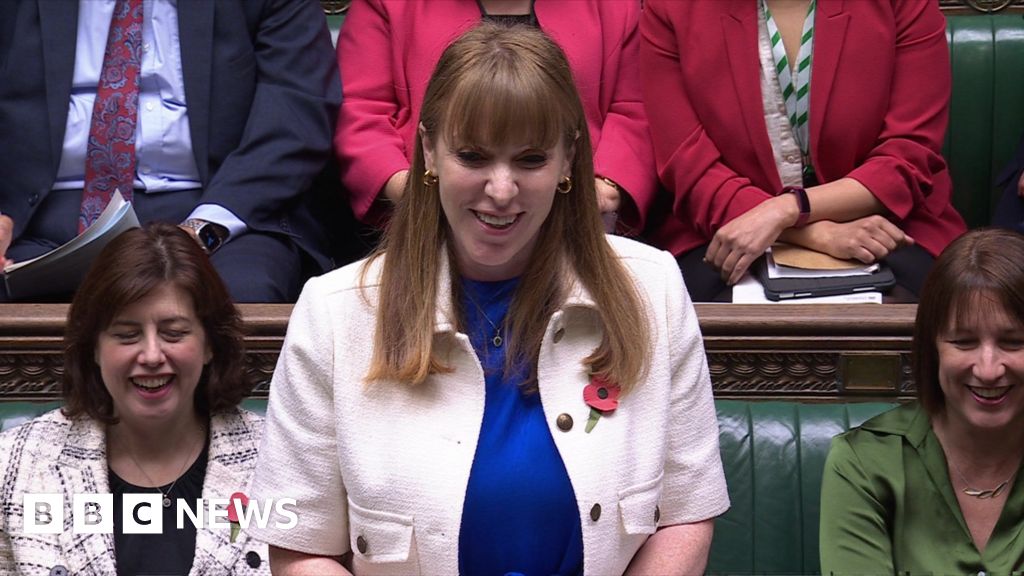
The deputy PM said she would miss their “battle of the gingers” in a light-hearted reference with Oliver Dowden to their similar hair colours.
Angela Rayner and the Tory deputy had been speaking about the roles of King Charles and the late Queen in the Commonwealth.
She suggested she did not expect to face Dowden again at PMQs after the Conservative Party chooses a new leader on 2 November.
Politics
How a LinkedIn post sparked a transatlantic row

 Getty Images
Getty ImagesLinkedIn: the social network for CVs, apparently motivational corporate messages and – as of late last night – transatlantic diplomatic spats.
When Sofia Patel, the Labour Party’s head of operations, posted on the site last week that she was coordinating nearly 100 current and former party officials to campaign in battleground states in the final weeks of the US presidential election, she surely could not have imagined that she would provoke a legal complaint filed in Florida.
In a formal complaint to the Federal Election Commission (FEC), the Trump presidential campaign’s deputy general counsel declared: “When representatives of the British government previously sought to go door-to-door in America, it did not end well for them.”
Last week, he noted, was the 243rd anniversary of the Battle of Yorktown – a military victory which ensured the United States’ enduring independence from “Great Britian” [sic].
Bombastic as that may sound, it’s hardly of trivial interest that a Labour Party that has conspicuously sought to improve its ties to Trump and his team is now being formally accused of “blatant foreign interference” on behalf of his opponent, Kamala Harris.
So what’s behind all this?
Under the FEC rules, foreign volunteers on US campaigns are permissible, as long as they are just that – volunteers – and are not compensated for their work.
That is exactly what Labour says these operatives were: volunteers. While Patel’s LinkedIn post told those interested in campaigning that “we will sort your housing”, it is being argued that this was imprecise language.
Sir Keir Starmer told reporters last night that Labour officials going to the US to campaign are “doing it as volunteers, they’re staying I think with other volunteers over there”.
‘Private citizens’
There is a question over what exactly Patel meant by saying she had “10 spots available” for people willing to campaign in North Carolina.
Did that entail travel costs to get there being covered? Even if it did, Labour are adamant that they did not pay.
But arguably the more pertinent charge, diplomatically at least, is the allegation that the Labour Party as an institution is formally coming to the aid of the Democrats.
This is being denied too. Labour sources say that Ms Patel was, in her spare time, organising party officials to go out to the US in their spare time.
That was the argument from Steve Reed, the environment secretary, this morning: “It’s up to private citizens how they use their time and their money”.
And of course, it’s not surprising that those on the left of politics here would want the Democratic candidate to win the US election, just as at least one recent former Conservative special adviser is currently in a swing state campaigning for Trump.
British obsession
There’s another element to this, too. The British political world is utterly obsessed with American politics, even if it is an almost totally unrequited passion.
Every four years, British politicos stream across the Atlantic for a taste of campaigning on a far bigger canvas.
There are numerous examples. Earlier this summer Nigel Farage, the Reform UK leader, was at the Republican convention just days after his election as an MP, as was Liz Truss, the former prime minister, just days after she lost her seat.
Penny Mordaunt, the former Conservative cabinet minister, worked for George W Bush before she became an MP. Liam Fox, another ex-Conservative MP, has had ties with senior figures in the Republicans for a number of years.
Not that the parties on either side of the Atlantic always match up neatly.
In January 2020, I was shadowing a small group of canvassers for Joe Biden in the New Hampshire presidential primary, when I realised that one of them was Sir Simon Burns, the former Conservative MP for Chelmsford.
In recent weeks Sir Robert Buckland, who lost his seat as a Conservative at the general election, has been in the US campaigning for Harris.
Awkward spot
Be all that as it may, it’s undeniable that this is a seriously awkward spot for the Labour government to find itself in, exactly two weeks before Starmer could well be placing a phone call congratulating President-Elect Trump.
In opposition and in government, Labour officials have invested significant energy in trying to forge links to Trump and his allies.
David Lammy, the foreign secretary, spent time with JD Vance, the senator from Ohio who then became Trump’s candidate for vice-president.
Diplomats were delighted with how quickly Starmer managed to speak on the phone to Trump after the failed assassination attempt on him in July, and just a few weeks ago they met for the first time over dinner at Trump Tower in New York.
Senior Labour figures believe that this legal wrangle is not really a rebuke of that approach, but instead just straightforward politicking from the Trump campaign, who are eager to use the Labour volunteers as a way to bash the Harris campaign in the crucial final stretch.
They need to be right.
Because if they are wrong, then this may not be a mere passing awkwardness, but a dispute threatening the most important diplomatic relationship any British prime minister has.
Politics
Health Secretary Wes Streeting will vote against legalising assisted dying
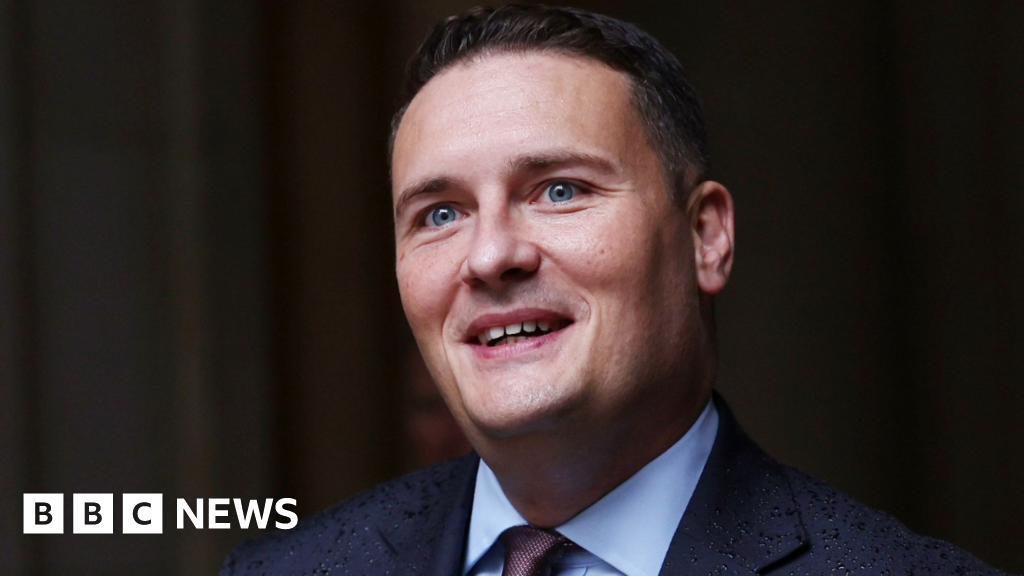
Health Secretary Wes Streeting will vote against changing the law on assisted dying, the BBC has confirmed.
Backbench Labour MP Kim Leadbeater has put forward a bill proposing that terminally ill adults nearing the end of their lives get the right to choose to shorten their deaths if they wish.
But in a meeting of Labour MPs on Monday, Streeting said he did not believe the palliative care system was good enough to support assisted dying.
The prime minister has made clear the government will remain neutral on the issue and MPs will be given a free vote.
A similar move was rejected by MPs in 2015, but recent polling has consistently suggested a majority of the public supports a change in the law.
Cabinet ministers have been instructed not to campaign in public on either side of the issue, ahead of a vote on the Terminally Ill Adults (End of Life) Bill on 29 November.
Dozens of Labour MPs are thought to be still undecided about the plans and Streeting’s intervention, first reported by The Times, could be especially influential because of his position as the health secretary.
It is also notable because Streeting voted for the legalisation of assisted dying the last time the Commons voted, in 2015 – meaning he has changed his mind.
Last month, he told the Financial Times he was “struggling” with the issue, saying he could “buy into the principle” of assisted dying but was “not sure as a country we have the right end-of-life care available to enable a real choice on assisted dying”.
Streeting is the second cabinet minister in two days to state their intention to vote against changing the law, after Justice Secretary Shabana Mahmood told The Times of her “unshakeable belief in the sanctity and the value of human life” on Tuesday.
Leadbeater has said patients with serious illnesses are suffering “horrible painful deaths” and that “people deserve a choice”.
Her bill would restrict assisted dying to terminally ill patients, and would require two doctors and a judge to sign it off. But opponents say there are still serious concerns about safeguards.
Earlier this month, Baroness Tanni Grey-Thompson told the BBC she was worried about the impact on vulnerable and disabled people, as well as the possibility of coercive control and the ability of doctors to predict how long a patient has left to live.
Assisted dying is generally used to describe a situation where someone who is terminally ill seeks medical help to obtain lethal drugs which they administer themselves.
Assisted suicide – intentionally helping another person to end their life – is currently banned in England, Wales and Northern Ireland, with a maximum prison sentence of 14 years.
The bill would cover England and Wales, where – like Northern Ireland – assisting someone to ending their life is against the law.
In Scotland – where it is not a specific criminal offence but can leave a person open to a murder charge – a bill is currently being considered that, if passed, would give terminally ill adults the right to request help to end their life.
Politics
UK and Germany to sign landmark ‘defence’ treaty

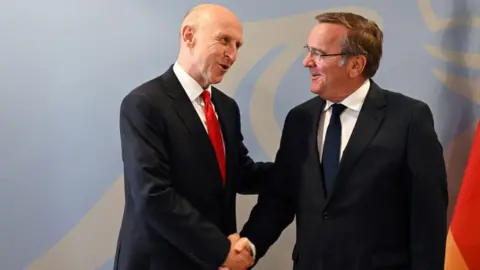 Getty Images
Getty ImagesBritain and Germany will sign what the UK government is calling a “landmark defence agreement” aimed at boosting security, investment and jobs.
Under the agreement, German defence company Rheinmetall will open a new factory in the UK to manufacture barrels for artillery guns – supporting 400 jobs.
Both countries will work together to develop drones and a new long-range missile.
German maritime surveillance aircraft will also periodically fly patrols of the North Atlantic from RAF Lossiemouth in Scotland.
Labour promised to build closer military ties with Germany while in opposition and this is part of a wider push by this government to reset relations with key European allies post Brexit.
The German Ambassador to the UK, Miguel Berger, said the European Commission will have a very strong focus on defence in the next five years, and there is space for the UK to be involved.
“Obviously the question is – what can the role of the British defence industry and of the capacities of the United Kingdom be in this joint endeavour?” he told BBC Radio 4’s Today programme.
The UK already has a defence pact with France – the Lancaster House Treaty signed in 2010 by David Cameron and Nicholas Sarkozy – but this is the first with Germany.
Germany and the UK are the two largest defence spenders in Europe and the biggest European military donors to Ukraine.
Defence Secretary John Healey said it was a “milestone moment”, bringing the two countries’ militaries and defence industries closer.
In reality the two nations already co-operate as members of the Nato alliance.
In a joint venture, they are also building new tanks and armoured vehicles for the British Army, Germany’s Rheinmetall and the UK’s BAE Systems-formed RBSL to manufacture the Boxer armoured fighting vehicle and the latest Challenger 3 tank in Telford, Shropshire.
 PA Media
PA MediaUnder the new Trinity House Agreement, Rheinmetall will build a factory in the UK to produce barrels for artillery guns – something the UK stopped doing more than a decade ago.
The site for the factory has not yet been announced, but the Ministry of Defence (MOD) says it will support more than 400 jobs and use British steel produced by Sheffield Forgemasters.
The steelmaker was recently acquired by the UK Government. The first artillery gun barrels are expected to roll off the production line in 2027.
The Trinity House Agreement also includes a commitment to develop a new long-range missile, which the MOD says will be more precise and can be fired further than any current systems – the UK’s Storm Shadow and Germany’s Taurus. Unlike the UK, Germany has refused to supply Ukraine with its Taurus cruise missile.
The UK and Germany will further co-operate on developing drones that might be able to fly alongside Typhoon jets operated by both countries.
German P8 maritime surveillance aircraft will periodically operate out of RAF Lossiemouth in Scotland to help patrol the North Atlantic. Other Nato allies have been doing the same for a number of years.
There is also a promise to bolster the defence of Nato’s eastern flank; both the UK and Germany have already sent hundreds of troops to the Baltic states as part of Nato’s enhanced defence plans following Russia’s invasion of Ukraine.
Germany’s Defence Minister Boris Pistorius said the agreement would strengthen Europe and Nato.
“We must not take security in Europe for granted,” he said, adding the projects being undertaken would be open to other partners.
Politics
Government to revive police firearms review
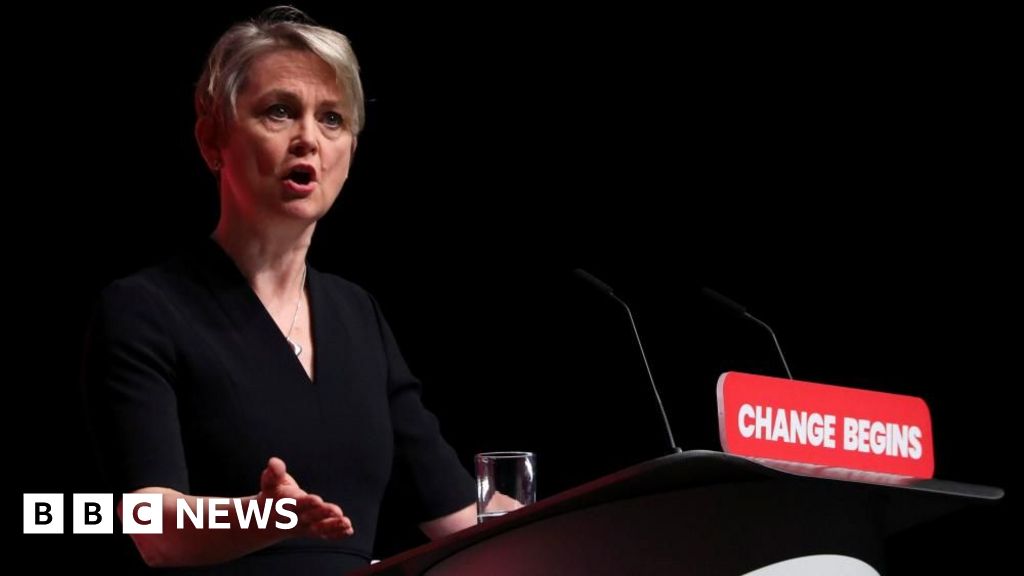
The government will revive a review into how police officers who take fatal shots in the line of duty are held to account following the shooting of Chris Kaba, the prime minister said.
The probe was initially launched by the previous government, but will now be completed by Home Secretary Yvette Cooper.
Sir Keir Starmer said it was important that the public have confidence in the police and that police have confidence in the government.
It comes days after police officer Martyn Blake was cleared of the murder of Mr Kaba.
“We are going to pick [the probe] up and complete that accountability review because it is important that the public have confidence in the police including of course the armed police,” Sir Keir said.
“It’s also important that the police know that we have confidence in them doing a very difficult job, so we will pick that up.”
He added that more details would be available later on Wednesday when Ms Cooper makes a statement in the House of Commons.
Under the current law, every armed police officer is personally responsible for their actions. Officers cannot use more force than is necessary to neutralise a threat.
A superior officer cannot tell a police officer to pull the trigger – nor can there be a pre-emptive tactical decision to shoot a suspect whatever the circumstances.
On Monday, police officer Mr Blake was cleared of murdering Chris Kaba, who he shot in the head during a police vehicle stop in south London two years ago.
It has since been revealed that Mr Kaba had shot a man in a nightclub days before his own death.
Reacting to the verdict Metropolitan Police Commissioner Sir Mark Rowley said no police officer was above the law but said the force had been clear “the system holding police to account is broken”.
“I worry about the lack of support officers face for doing their best, but most of all, I worry for the public,” he said.
“The more we crush the spirit of good officers, the less they can fight crime – that risks London becoming less safe.”
Abimbola Johnson, a barrister on a scrutiny board set up by the National Police Chiefs Council in the summer to boost confidence among minority ethnic people, warned against using the Kaba case to push for legislative change.
“It is already extremely rare for us to see police officers being prosecuted under the criminal justice system for action they have conducted whilst in the line of duty,” she told BBC Radio 4’s Today programme.
She added: “This is not a typical case, therefore, using this as a reason to push for legislative change, it doesn’t make sense, because this isn’t normally what would happen throughout the process.”
Politics
Labour volunteers in US helping Harris ‘in spare time’
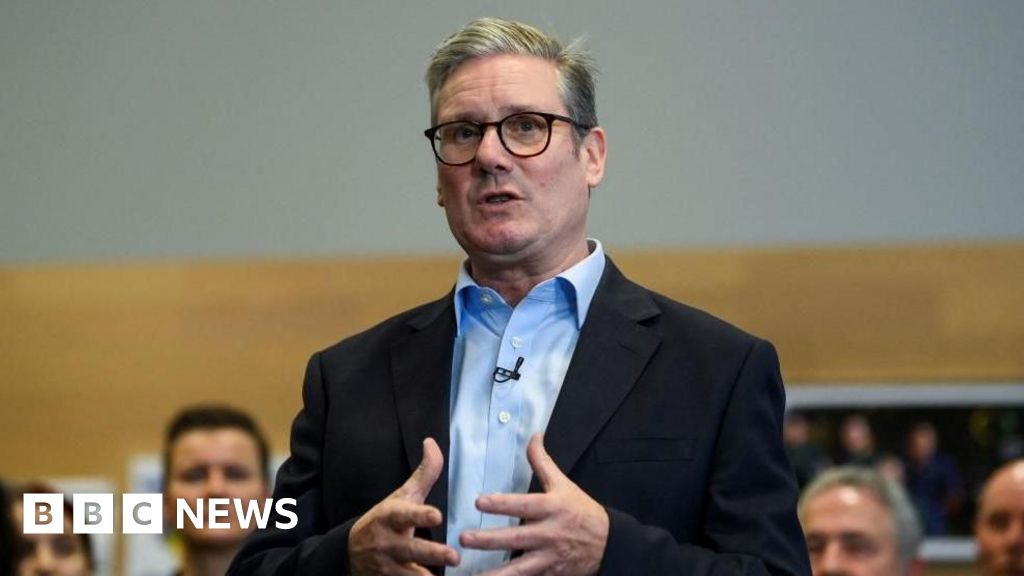
Prime Minister Sir Keir Starmer has sought to play down the significance of alleged interference by the Labour Party in the American presidential election.
The Trump Campaign has filed a complaint with the Federal Election Commission in Washington seeking an immediate investigation – after the Head of Operations for the Labour Party, Sofia Patel, posted on social media that she had “ten spots available” for anyone willing to travel to North Carolina to campaign for Kamala Harris, adding “we will sort your housing”.
She said she had around 100 current and former party staff heading to America before polling day.
The post, on LinkedIn, has since been deleted.
Foreign nationals are permitted to serve as volunteers on campaigns in the US as long as they are not compensated, according to Federal Election Commission rules.
The complaint from the Trump Campaign is both pointed and theatrical.
“When representatives of the British government previously sought to go door-to-door in America, it did not end well for them,” it read.
That is a matter-of-fact reference to US independence around 250 years ago.
On matters more contemporary it requests “an immediate investigation” into what it calls “blatant foreign interference”.
Speaking to reporters while flying to the Commonwealth Heads of Government Summit in Samoa in the south Pacific, the prime minister said: “The Labour Party has volunteers, [they] have gone over pretty much every election.
“They’re doing it in their spare time. They’re doing it as volunteers. They’re staying I think with other volunteers over there.”
The Trump Campaign letter to the Federal Election Commission also says: “Morgan McSweeney, the Prime Minister’s chief of staff, and Matthew Doyle, director of communications, attended the (Democratic) convention in Chicago and met with Ms Harris’ campaign team.
“Deborah Mattinson, Sir Keir’s director of strategy, also went to Washington in September to brief Ms Harris’ presidential campaign on Labour’s election-winning approach.”
Ms Mattinson no longer works for the Labour Party.
Party sources say Mr Doyle and Mr McSweeney went to the Democratic Convention in their own time, and that the Democratic Party didn’t pay their travel and accommodation costs.
It isn’t clear who did.
Asked if the row risked jeopardising his relationship with Donald Trump, the prime minister said “no” – pointing to the dinner the two men had together at Trump Tower in New York last month.
“We established a good relationship. We’re grateful for him for making the time… for that dinner,” Sir Keir said.
“We had a good, constructive discussion and, of course as prime minister of the United Kingdom I will work with whoever the American people return as their President in their elections, which are very close now.”
Sir Keir has never met the Vice-President Harris, Trump’s Democratic rival.
But he has met President Biden several times since becoming prime minister in July.
-

 Science & Environment1 month ago
Science & Environment1 month agoHyperelastic gel is one of the stretchiest materials known to science
-

 Technology4 weeks ago
Technology4 weeks agoIs sharing your smartphone PIN part of a healthy relationship?
-

 Science & Environment1 month ago
Science & Environment1 month ago‘Running of the bulls’ festival crowds move like charged particles
-

 Science & Environment1 month ago
Science & Environment1 month agoHow to unsnarl a tangle of threads, according to physics
-

 Science & Environment1 month ago
Science & Environment1 month agoMaxwell’s demon charges quantum batteries inside of a quantum computer
-

 Technology1 month ago
Technology1 month agoWould-be reality TV contestants ‘not looking real’
-

 Science & Environment4 weeks ago
Science & Environment4 weeks agoX-rays reveal half-billion-year-old insect ancestor
-

 Science & Environment1 month ago
Science & Environment1 month agoSunlight-trapping device can generate temperatures over 1000°C
-

 Science & Environment1 month ago
Science & Environment1 month agoLiquid crystals could improve quantum communication devices
-

 Science & Environment1 month ago
Science & Environment1 month agoQuantum ‘supersolid’ matter stirred using magnets
-

 Technology3 weeks ago
Technology3 weeks agoUkraine is using AI to manage the removal of Russian landmines
-

 Womens Workouts4 weeks ago
Womens Workouts4 weeks ago3 Day Full Body Women’s Dumbbell Only Workout
-

 TV3 weeks ago
TV3 weeks agoসারাদেশে দিনব্যাপী বৃষ্টির পূর্বাভাস; সমুদ্রবন্দরে ৩ নম্বর সংকেত | Weather Today | Jamuna TV
-

 Science & Environment1 month ago
Science & Environment1 month agoLaser helps turn an electron into a coil of mass and charge
-

 Science & Environment1 month ago
Science & Environment1 month agoWhy this is a golden age for life to thrive across the universe
-

 Science & Environment1 month ago
Science & Environment1 month agoA new kind of experiment at the Large Hadron Collider could unravel quantum reality
-

 Science & Environment1 month ago
Science & Environment1 month agoQuantum forces used to automatically assemble tiny device
-

 News3 weeks ago
News3 weeks agoMassive blasts in Beirut after renewed Israeli air strikes
-

 News3 weeks ago
News3 weeks agoNavigating the News Void: Opportunities for Revitalization
-

 Football3 weeks ago
Football3 weeks agoRangers & Celtic ready for first SWPL derby showdown
-

 Science & Environment1 month ago
Science & Environment1 month agoA slight curve helps rocks make the biggest splash
-

 Science & Environment1 month ago
Science & Environment1 month agoNerve fibres in the brain could generate quantum entanglement
-

 Science & Environment1 month ago
Science & Environment1 month agoHow to wrap your mind around the real multiverse
-

 Business3 weeks ago
Business3 weeks agoWhen to tip and when not to tip
-

 News3 weeks ago
News3 weeks ago▶ Hamas Spent $1B on Tunnels Instead of Investing in a Future for Gaza’s People
-

 MMA3 weeks ago
MMA3 weeks agoJulianna Peña trashes Raquel Pennington’s behavior as champ
-
Business3 weeks ago
DoJ accuses Donald Trump of ‘private criminal effort’ to overturn 2020 election
-

 Technology3 weeks ago
Technology3 weeks agoSamsung Passkeys will work with Samsung’s smart home devices
-

 Science & Environment1 month ago
Science & Environment1 month agoITER: Is the world’s biggest fusion experiment dead after new delay to 2035?
-

 Science & Environment1 month ago
Science & Environment1 month agoNuclear fusion experiment overcomes two key operating hurdles
-

 News1 month ago
News1 month ago▶️ Hamas in the West Bank: Rising Support and Deadly Attacks You Might Not Know About
-

 News1 month ago
News1 month ago▶️ Media Bias: How They Spin Attack on Hezbollah and Ignore the Reality
-

 Technology3 weeks ago
Technology3 weeks agoMicrophone made of atom-thick graphene could be used in smartphones
-

 MMA2 weeks ago
MMA2 weeks ago‘Uncrowned queen’ Kayla Harrison tastes blood, wants UFC title run
-

 MMA3 weeks ago
MMA3 weeks agoPereira vs. Rountree prediction: Champ chases legend status
-

 Sport3 weeks ago
Sport3 weeks agoWales fall to second loss of WXV against Italy
-

 Science & Environment1 month ago
Science & Environment1 month agoTime travel sci-fi novel is a rip-roaringly good thought experiment
-

 Technology4 weeks ago
Technology4 weeks agoWhy Machines Learn: A clever primer makes sense of what makes AI possible
-

 Science & Environment1 month ago
Science & Environment1 month agoPhysicists have worked out how to melt any material
-
News1 month ago
the pick of new debut fiction
-

 Technology1 month ago
Technology1 month agoMeta has a major opportunity to win the AI hardware race
-

 News1 month ago
News1 month agoOur millionaire neighbour blocks us from using public footpath & screams at us in street.. it’s like living in a WARZONE – WordupNews
-

 Sport3 weeks ago
Sport3 weeks agoBoxing: World champion Nick Ball set for Liverpool homecoming against Ronny Rios
-

 MMA3 weeks ago
MMA3 weeks agoDana White’s Contender Series 74 recap, analysis, winner grades
-

 Technology3 weeks ago
Technology3 weeks agoMusk faces SEC questions over X takeover
-

 Sport3 weeks ago
Sport3 weeks agoWorld’s sexiest referee Claudia Romani shows off incredible figure in animal print bikini on South Beach
-

 Technology3 weeks ago
Technology3 weeks agoThis AI video generator can melt, crush, blow up, or turn anything into cake
-

 News3 weeks ago
News3 weeks agoFamily plans to honor hurricane victim using logs from fallen tree that killed him
-

 Technology3 weeks ago
Technology3 weeks agoThe best budget robot vacuums for 2024
-

 MMA3 weeks ago
MMA3 weeks agoPereira vs. Rountree preview show live stream
-

 Sport3 weeks ago
Sport3 weeks agoMan City ask for Premier League season to be DELAYED as Pep Guardiola escalates fixture pile-up row
-

 News3 weeks ago
News3 weeks agoGerman Car Company Declares Bankruptcy – 200 Employees Lose Their Jobs
-

 News3 weeks ago
News3 weeks ago‘Blacks for Trump’ and Pennsylvania progressives play for undecided voters
-

 Sport3 weeks ago
Sport3 weeks agoCoco Gauff stages superb comeback to reach China Open final
-
Business3 weeks ago
Bank of England warns of ‘future stress’ from hedge fund bets against US Treasuries
-

 Business3 weeks ago
Business3 weeks agoChancellor Rachel Reeves says she needs to raise £20bn. How might she do it?
-

 Technology3 weeks ago
Technology3 weeks agoTexas is suing TikTok for allegedly violating its new child privacy law
-

 Sport3 weeks ago
Sport3 weeks agoSturm Graz: How Austrians ended Red Bull’s title dominance
-

 Money3 weeks ago
Money3 weeks agoWetherspoons issues update on closures – see the full list of five still at risk and 26 gone for good
-

 News3 weeks ago
News3 weeks agoHeavy strikes shake Beirut as Israel expands Lebanon campaign
-

 TV2 weeks ago
TV2 weeks agoLove Island star sparks feud rumours as one Islander is missing from glam girls’ night
-

 MMA3 weeks ago
MMA3 weeks agoAlex Pereira faces ‘trap game’ vs. Khalil Rountree
-

 Technology3 weeks ago
Technology3 weeks agoJ.B. Hunt and UP.Labs launch venture lab to build logistics startups
-

 TV3 weeks ago
TV3 weeks agoPhillip Schofield accidentally sets his camp on FIRE after using emergency radio to Channel 5 crew
-

 News3 weeks ago
News3 weeks agoHeartbreaking end to search as body of influencer, 27, found after yacht party shipwreck on ‘Devil’s Throat’ coastline
-
Business3 weeks ago
Sterling slides after Bailey says BoE could be ‘a bit more aggressive’ on rates
-

 Technology3 weeks ago
Technology3 weeks agoMicrosoft just dropped Drasi, and it could change how we handle big data
-

 MMA3 weeks ago
MMA3 weeks agoUFC 307 preview show: Will Alex Pereira’s wild ride continue, or does Khalil Rountree shock the world?
-
Business3 weeks ago
Head of UK Competition Appeal Tribunal to step down after rebuke for serious misconduct
-

 Technology3 weeks ago
Technology3 weeks agoThe best shows on Max (formerly HBO Max) right now
-

 Science & Environment1 month ago
Science & Environment1 month agoPhysicists are grappling with their own reproducibility crisis
-

 Football3 weeks ago
Football3 weeks agoSimo Valakari: New St Johnstone boss says Scotland special in his heart
-

 News3 weeks ago
News3 weeks agoWoman who died of cancer ‘was misdiagnosed on phone call with GP’
-

 Sport3 weeks ago
Sport3 weeks agoChina Open: Carlos Alcaraz recovers to beat Jannik Sinner in dramatic final
-

 News3 weeks ago
News3 weeks agoHull KR 10-8 Warrington Wolves – Robins reach first Super League Grand Final
-

 MMA3 weeks ago
MMA3 weeks agoKetlen Vieira vs. Kayla Harrison pick, start time, odds: UFC 307
-

 Science & Environment3 weeks ago
Science & Environment3 weeks agoMarkets watch for dangers of further escalation
-

 Technology3 weeks ago
Technology3 weeks agoGmail gets redesigned summary cards with more data & features
-

 TV3 weeks ago
TV3 weeks agoMaayavi (මායාවී) | Episode 23 | 02nd October 2024 | Sirasa TV
-

 Technology3 weeks ago
Technology3 weeks agoPopular financial newsletter claims Roblox enables child sexual abuse
-

 Technology3 weeks ago
Technology3 weeks agoOpenAI secured more billions, but there’s still capital left for other startups
-

 Health & fitness3 weeks ago
Health & fitness3 weeks agoNHS surgeon who couldn’t find his scalpel cut patient’s chest open with the penknife he used to slice up his lunch
-
Business3 weeks ago
The search for Japan’s ‘lost’ art
-

 Sport3 weeks ago
Sport3 weeks agoAaron Ramsdale: Southampton goalkeeper left Arsenal for more game time
-

 News3 weeks ago
News3 weeks agoBalancing India and China Is the Challenge for Sri Lanka’s Dissanayake
-

 Entertainment3 weeks ago
Entertainment3 weeks ago“Golden owl” treasure hunt launched decades ago may finally have been solved
-

 Entertainment3 weeks ago
Entertainment3 weeks agoNew documentary explores actor Christopher Reeve’s life and legacy
-

 Science & Environment1 month ago
Science & Environment1 month agoA tale of two mysteries: ghostly neutrinos and the proton decay puzzle
-
Business4 weeks ago
Eurosceptic Andrej Babiš eyes return to power in Czech Republic
-

 Technology3 weeks ago
Technology3 weeks agoUniversity examiners fail to spot ChatGPT answers in real-world test
-

 Sport1 month ago
Sport1 month agoJoshua vs Dubois: Chris Eubank Jr says ‘AJ’ could beat Tyson Fury and any other heavyweight in the world
-
News1 month ago
The Project Censored Newsletter – May 2024
-

 Technology4 weeks ago
Technology4 weeks agoArtificial flavours released by cooking aim to improve lab-grown meat
-

 Technology3 weeks ago
Technology3 weeks agoEpic Games CEO Tim Sweeney renews blast at ‘gatekeeper’ platform owners
-
Business3 weeks ago
Top shale boss says US ‘unusually vulnerable’ to Middle East oil shock
-

 News3 weeks ago
News3 weeks agoLiverpool secure win over Bologna on a night that shows this format might work
-

 Technology3 weeks ago
Technology3 weeks agoAmazon’s Ring just doubled the price of its alarm monitoring service for grandfathered customers
-

 Football3 weeks ago
Football3 weeks agoWhy does Prince William support Aston Villa?
-

 MMA3 weeks ago
MMA3 weeks agoKayla Harrison gets involved in nasty war of words with Julianna Pena and Ketlen Vieira
-

 Technology3 weeks ago
Technology3 weeks agoApple iPhone 16 Plus vs Samsung Galaxy S24+


You must be logged in to post a comment Login